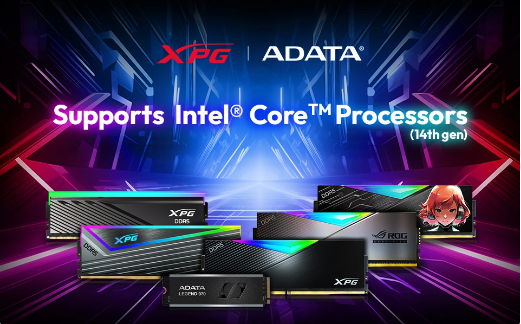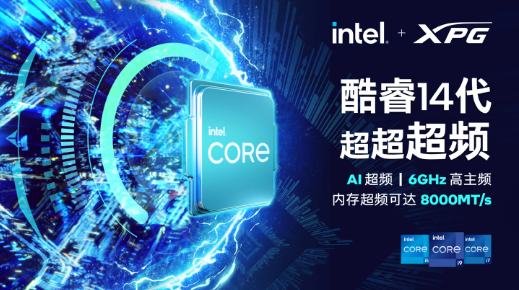 Technology peripherals
Technology peripherals
 It Industry
It Industry
 ADATA XPG LANCER DDR5 8400 memory planned to appear in the fourth quarter
ADATA XPG LANCER DDR5 8400 memory planned to appear in the fourth quarter
ADATA XPG LANCER DDR5 8400 memory planned to appear in the fourth quarter
Intel announced on October 17 the grand launch of its new 14th generation Core desktop processor. The first batch of products includes i9-14900K/KF, i7-14700K/KF and i5-14600K/KF, with a total of six models. This news has attracted widespread industry attention

According to my understanding, ADATA has responded quickly and announced that its well-known e-sports brand XPG will fully support the 14th generation Core processor platform, and launched a new series of DDR5 memory and PCIe Gen5 solid-state drives. This series of products is planned to be officially released in the fourth quarter, the most eye-catching of which is XPG LANCER DDR5 memory, which will provide ultra-high operating speeds of 7600MT/s, 8000MT/s and 8400MT/s
According to the introduction , although the current mainstream speed of DDR5 memory is still 5600MT/s, XPG LANCER DDR5 memory equipped with 14th generation Core processor will achieve an extraordinary speed of 8000MT/s, and also supports Intel XMP Ready overclocking technology, with a maximum frequency of up to The jaw-dropping 8400MT/s to 9900MT/s

In addition, ADATA's LEGEND 970 PCIe 5.0 SSD will become a powerful performance tool. After testing, it showed amazing continuous read and write speeds, up to 10000MB/s, and 4K random write speeds up to 1400K
According to information from ADATA’s official website, the XPG LANCER BLADE series DDR5 memory is available in 16GB and 32GB capacities. In terms of specifications, there are two speeds: 6000MT/s and 6400MT/s, the timings are CL30 and CL32 respectively, and the operating voltage is between 1.35-1.4V. This memory measures 133.35 x 33.8 x 7.8mm, which makes it ideal for small PC cases and avoids interference with tower CPU cooling systems. In addition, it also supports Intel XMP 3.0 and AMD EXPO memory overclocking technology, providing more choices and performance advantages for the majority of e-sports players
The above is the detailed content of ADATA XPG LANCER DDR5 8400 memory planned to appear in the fourth quarter. For more information, please follow other related articles on the PHP Chinese website!

Hot AI Tools

Undresser.AI Undress
AI-powered app for creating realistic nude photos

AI Clothes Remover
Online AI tool for removing clothes from photos.

Undress AI Tool
Undress images for free

Clothoff.io
AI clothes remover

Video Face Swap
Swap faces in any video effortlessly with our completely free AI face swap tool!

Hot Article

Hot Tools

Notepad++7.3.1
Easy-to-use and free code editor

SublimeText3 Chinese version
Chinese version, very easy to use

Zend Studio 13.0.1
Powerful PHP integrated development environment

Dreamweaver CS6
Visual web development tools

SublimeText3 Mac version
God-level code editing software (SublimeText3)

Hot Topics
 1389
1389
 52
52
 ADATA showcases XPG Nia handheld console: first equipped with LPCAMM2 memory, liftable screen, focusing on community transformation
Jun 06, 2024 pm 01:11 PM
ADATA showcases XPG Nia handheld console: first equipped with LPCAMM2 memory, liftable screen, focusing on community transformation
Jun 06, 2024 pm 01:11 PM
According to news from this site on June 5, ADATA demonstrated an early prototype of the Nia game handheld console at the 2024 Taipei International Computer Show. It is characterized by being equipped with upgradeable LPCAMM2 memory, and the screen can be tilted upward, and focuses on community Modification. Design: In terms of design, the ADATA XPG Gia game handheld console is equipped with a front-facing web camera and a display screen that can be tilted upward to facilitate users to switch viewing angles. Internal design One of the features of the XPGNia handheld is its internal support for upgrades and modifications. The handheld has a built-in M.22230 slot for user-reusable solid-state storage. It is also the first handheld to use LPCAMM2 memory, which means You can also remove and replace memory. Community modded ADATA also plans to be released on Nia handheld console
 ADATA XPG FUSION 1600W ATX 3.0 titanium power supply is on sale: supports dual-channel RTX 4090, 4999 yuan
Mar 11, 2024 pm 04:50 PM
ADATA XPG FUSION 1600W ATX 3.0 titanium power supply is on sale: supports dual-channel RTX 4090, 4999 yuan
Mar 11, 2024 pm 04:50 PM
According to news from this site on March 11, the national version of ADATA XPGFUSION1600W titanium power supply has been put on JD.com. This power supply is compatible with ATX3.0 and PCIe5.0 standards, supports dual-channel RTX4090 graphics cards, and sells for 4,999 yuan. According to reports, the XPGFUSION1600W titanium full module power supply is a product jointly developed by ADATA and Delta Electronics. It has 80PLUS titanium and Cybenetics titanium certification. The overall size of the power supply is 210x150x86mm, with a built-in 135mm fan, dual ball bearings, and a rotation speed of 2700±10 %RPM, supports XPGPRIME management software parameter adjustment. In terms of interface, this power supply is equipped with a 24Pin motherboard power supply.
 Up to 6800CL34, ADATA XPG launches ASUS TUF GAMING co-branded Longyao D300G memory module
Jun 20, 2024 pm 08:23 PM
Up to 6800CL34, ADATA XPG launches ASUS TUF GAMING co-branded Longyao D300G memory module
Jun 20, 2024 pm 08:23 PM
According to news from this website on June 20, XPG, the gaming hardware brand of ADATA, recently launched the Longyao D300GTUFGAMING co-branded DDR5U-DIMM memory module, which is available in black and white. This series of co-branded memory modules is based on the original Longyao D300G, and the cooling vest is decorated with ASUS TUFGAMING "E-Sports Agent" themed text and graphics. According to ADATA, the Longyao D300GTUFGAMING co-branded memory module is specially designed for FPS game enthusiasts. It has excellent appearance and high performance, meeting the stringent requirements of FPS games for hardware stability. Longyao D300GTUFGAMING co-branded memory is 40mm high, available in 6000CL30, 6400CL32 and 68
 Designed specifically for mobile phones, ADATA launches SC750 cable-free mobile solid-state drive
Jul 24, 2024 pm 09:06 PM
Designed specifically for mobile phones, ADATA launches SC750 cable-free mobile solid-state drive
Jul 24, 2024 pm 09:06 PM
According to news from this site on July 24, ADATA launched the SC750 mobile solid-state drive today. This mobile solid-state drive is specially designed for mobile phones. It adopts a cable-free structure and a push-out interface, making it lightweight and portable. ADATA SC750 mobile solid-state drive has a three-dimensional dimension of 53.0×27.5×11.89 (mm), weighs 11.15g, is close to a flash drive (U disk) in size, and supports working at 5~50℃. It is equipped with a USB3.2Gen2Type-C interface and supports a 10Gbps transmission rate, with a sequential read rate of up to 1050MB/s and a sequential write rate of up to 1000MB/s. ADATA SC750 mobile solid-state drive can realize ProRes format video external recording when connected to Apple iPhone15Pro/Max mobile phone
 ADATA demonstrates the XPG Hurricane MAG 120 cooling fan that supports front-reverse flipping and magnetic connection at the CES show
Jan 16, 2024 am 11:03 AM
ADATA demonstrates the XPG Hurricane MAG 120 cooling fan that supports front-reverse flipping and magnetic connection at the CES show
Jan 16, 2024 am 11:03 AM
According to news from this site on January 14, ADATA displayed a series of new products at the CES2024 electronics show, such as LancerRGB8000DDR5 memory, and also brought a variety of new radiator products. This XPG HurricaneMAG120 fan supports forward or reverse rotation and supports magnetic connection, which can minimize the exposure of unsightly wires and make cleaning easy. This fan uses hydrodynamic bearings and X-shaped blades, can reach speeds of 2000RPM (similar CFM in either direction), and is compatible with most mainstream motherboard ARGB software. This site noticed that ADATA also showed off another all-in-one water-cooling radiator, Levante II, which has a unique RGB lighting effect and supports the 14th generation Intel Core CPU and
 ADATA launches XENIA 15G 2024 gaming laptop overseas: i7-14700HX + 105W RTX4060/4070
Mar 01, 2024 am 09:52 AM
ADATA launches XENIA 15G 2024 gaming laptop overseas: i7-14700HX + 105W RTX4060/4070
Mar 01, 2024 am 09:52 AM
According to news from this site on February 29, XPG, a subsidiary of ADATA, today launched a gaming laptop model named "XENIA15G2024" overseas. The price has not yet been announced. In terms of performance, this notebook is equipped with a 20-core 28-thread Intel Core i7-14700HX processor, equipped with 105WRTX4060/4070 graphics card, 16GBDDR5-5600RAM and 1TBPCIe4.0SSD, with 3 built-in fans and 5 heat pipes. In terms of screen, this site noticed that this notebook is equipped with a 15.6-inch 144Hz 1080PIPS screen. The official does not provide brightness and color gamut information. In addition, this notebook weighs 2.25 kg, has a battery capacity of 53.35Whr, and supports Wi-Fi6E and Bluetooth.
 ADATA's new product XPG Project NeonStorm is launched: independent water cooling, writing speed reaches 12000 MB/s
Jan 05, 2024 pm 03:46 PM
ADATA's new product XPG Project NeonStorm is launched: independent water cooling, writing speed reaches 12000 MB/s
Jan 05, 2024 pm 03:46 PM
According to news from this site on January 4, with the implementation of PCIeGen5 storage solutions, the transmission rate of solid-state drives has also been significantly improved, but heat dissipation problems have also arisen. ADATA recently issued a press release stating that it will display the XPG Project Neon Storm PCIe Gen5 M.2 SSD at the CES2024 exhibition. The biggest highlight is the use of a proprietary water cooling solution, combined with an aluminum structure and front and rear fans to achieve efficient heat dissipation. ADATA said in a press release: "Project NeonStorm is the industry's first M.2 solid-state drive to introduce water cooling and fans. After the coolant absorbs heat, it transfers the heat to the aluminum alloy tube, and then discharges the heat through the fans at both ends of the radiator. form a complete convection
 ADATA XPG launches INVADER X BTF mid-tower chassis overseas: sea view room design, supports back-plug motherboard
Jul 19, 2024 am 11:53 AM
ADATA XPG launches INVADER X BTF mid-tower chassis overseas: sea view room design, supports back-plug motherboard
Jul 19, 2024 am 11:53 AM
According to news from this site on July 10, ADATA XPG launched the INVADERXBTF mid-tower chassis in overseas markets today. This case adopts the popular column-free sea view room design and supports back-plugging of the motherboard. ADATA XPGINVADER In addition, this case also provides 10 120mm fan positions, 5 fans are pre-installed at the factory (4 are reverse blades), and the cable management space is 36mm. The IVADERX BTF chassis is also equipped with a modular hard drive bracket that supports the installation of up to three 3.5-inch/2.5-inch hard drives. In terms of compatibility, this chassis CPU is loose



